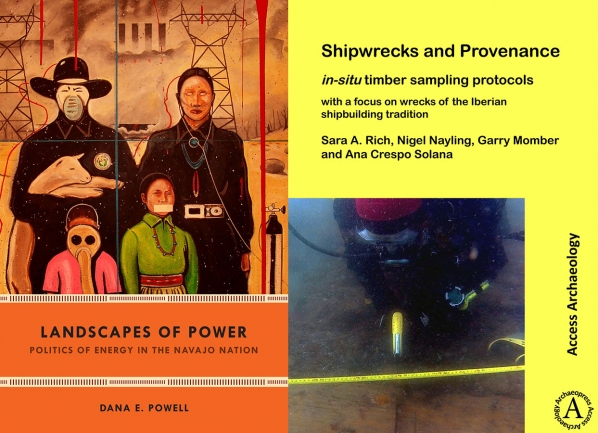Two scholarly books have just been published by Appalachian State faculty who are teaching in the Honors College this semester! Congratulations to Dr. Dana Powell, Assistant Professor in the Department of Anthropology, and Dr. Sara Rich, Lecturer in the Department of Art, on their recent publications. You will find brief descriptions and more about each of their books below.
Dr. Powell's new book explores how debates over intensive mineral extraction in the Navajo Nation force a rethinking of both sovereignty and sustainability in Native America. The book, "Landscapes of Power: Politics of Energy in the Navajo Nation," appears in the New Ecologies for the Twenty-First Century series by Duke University Press. The introduction is now available to view online by clicking here. For the full story of Dr. Powell's debut publication at Appalachian Today, click here, and for the story from the Department of Anthropology, click here.
Dr. Rich's new co-authored book is a heavily illustrated, thrilling, and adventurous sea-tale about chopping up wooden shipwrecks for science. The book, "Shipwrecks and Provenance: In-Situ Timber Sampling Protocols with a Focus on Wrecks of the Iberian Shipbuilding Tradition" has just been released and is available in print or as a free PDF download, here.
In Honors this semester, Dr. Powell is teaching a junior level Honors seminar, HON 3515-101: Native Americans/ Indigenous Studies (NAIS). In that course, students are learning about NAIS as a body of critical theory and cultural critique, and exploring urgent issues facing North American Native Nations today. The class is studying indigeneity and settler colonialism as theoretical concepts and lived experiences that foster a diverse range of responses (e.g., decolonization theory and practice, expressive culture and art, and sociopolitical movements).
Dr. Rich is teaching another junior level Honors seminar, HON 3515-104: Wrack and Ruin: The Aesthetics of Destruction. This course explores how representations of ruins characterize how we feel about the times and spaces we inhabit. As her course description explains, "Humans love to create things for perpetuity, even though we know that all materials are subject to the forces of entropy. Buildings are abandoned, statues crumble, ships sink, tombs are vandalized, and art decays along with everything else. But the ruins themselves can also capture the human imagination, and many of them survive in their altered state as popular destinations and the subjects of postcards, obligatory snapshots, and watercolor sketches sold to tourists."
We are privileged to have you both teaching in the Honors College this semester, and we look forward to reading the books!

